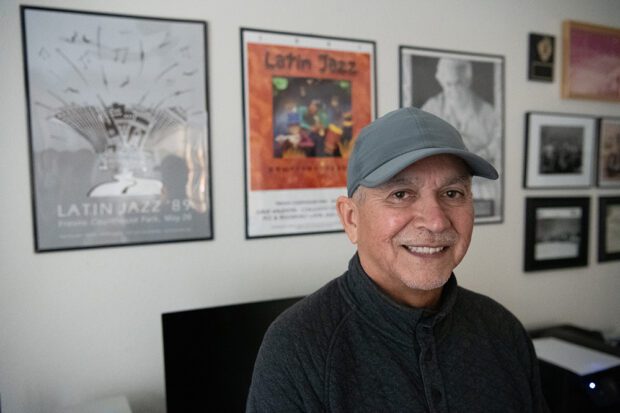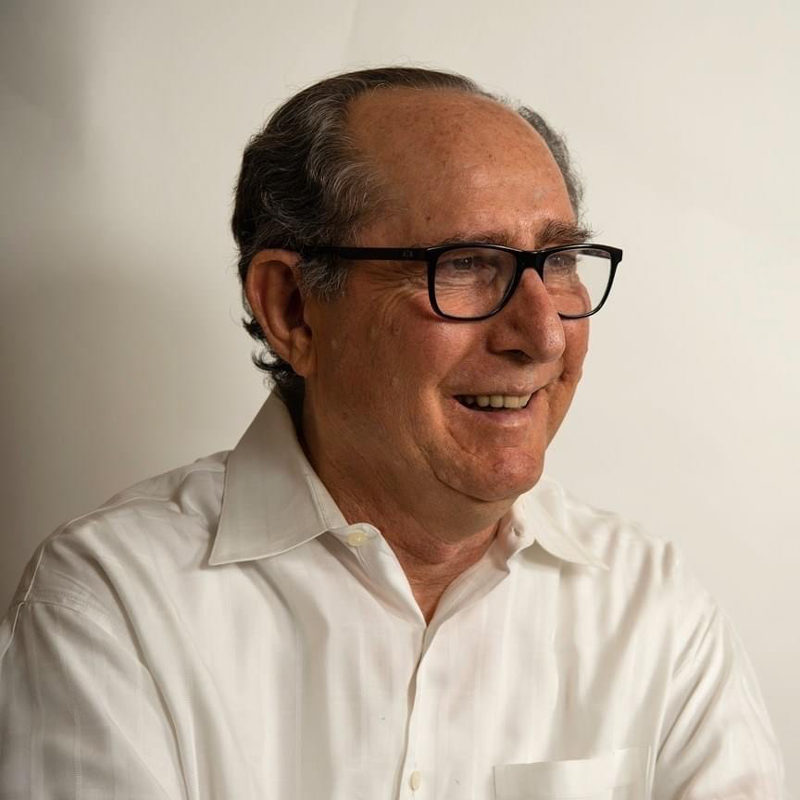
Steve Alcala was born in Hanford, then moved to Fresno as a young child. He graduated from Roosevelt High School in southeast Fresno, and then in 1979 from Fresno State, with a major in music.
“Let me start from the beginning,” Alcala said.
“When I took over the music program at Roosevelt High School in 1982, it was called the Roosevelt Marimba Band. It was based around a marimba. We played some Herb Alpert tunes. Then we had guitars, and we had folklórico dancers.
“It was really formed by a Spanish teacher, Margie Fenton, who wanted to get more Mexican kids involved with the arts, particularly performing arts. Southeast Fresno had a large Mexican community. It still does.
“She heard some kids playing, I think it was Sabor a Mí, in the band room on guitar. They were playing the wrong chords, and she was passing by the room. She said, ‘No, no, this is how you play.’
“She showed them the right chords, and it gave her the idea of creating a band of musicians. They didn’t have to read [music] as long as they could learn by ear. And so, she formed this marimba band, as she called it.
“And it wasn’t really about traditional music from Mexico or like that. It was just basically getting Mexican kids involved in the music program.
“It expanded into being a folklórico and rumba band. The rumba band would play songs for the dancers, and they would dance and stuff. So I [led] that for many years. But then I started listening. I go, ‘enough of Sabor a Mí and all these other standard Mexican melodies, maybe the kids could be challenged a little bit more with a different style.’
“My wife [and] her father are from Tampico [Mexico], which is in the Caribbean. She had learned about salsa from him, because all the musicians would come from Cuba, and they would go to Tampico and all the…bands used to play there, the Charanga bands and the ones that played Danzón. She had a large collection of salsa records from her father. She said, ‘Why don’t you check this stuff out?’ I went, ‘that’s really cool. I really enjoy this.’
“The first [Latin jazz] I had my kids play, that I transcribed, was [Tito Puente’s] ‘Ran Kan Kan.’. The one before that was by Carlos Santana, which was kind of a Latin rock kind of piece, but it wasn’t really what I wanted. I wanted to be a little more Afro-Caribbean based. I started getting a bigger repertoire, but I had to transcribe it all, because the music that I loved—Tito Puente, Poncho Sanchez, Pete Escovedo—there wasn’t any sheet music for that back when I started the class.”
Alcala went to San Francisco in 1984 and visited Tito Puente at the Fairmont Hotel, where he was performing. Puente was an internationally known timbalero and bandleader who recorded more than 100 LPs. Alcala asked Puente if he would consider coming to Fresno for a concert, and Puente said he would.
A year later, the arrangements were made, and the concert was set for the Roosevelt High School auditorium, which held 2,000 people. Around 1,500 came out. The opening act was Roosevelt’s Latin Jazz Band, and Puente came out to join them at the end of their set, soloing on ‘Ran Kan Kan.’ This caused a stir among Puente’s musicians.
Alcala said, “They were looking behind the curtains and watching us play. They couldn’t believe we were playing ‘Ran Kan Kan’…You could see them peeking back there. They couldn’t believe these were kids doing their music!”
Since “Ran Kan Kan,” Alcala has transcribed or solicited 600 charts from 70 artists. The vehicle for that was his music publishing company, 3-2 Music, which distributes sheet music and pays royalties to composers. Latin jazz composers sometimes work without sheet music, or they write out the music just for their own bands. 3-2 Music was a game changer.
Alcala followed his own tastes, cold calling artists who recorded songs he liked to ask permission to publish those songs. He would run up to the Bay Area to obtain records that could not be found in Fresno. He was filling a niche.
“Back when I started,” Alcala said, “I had a fax machine. I would come home after a long day of teaching, and there’s a stack of orders in my fax machine. And fortunately, Kinko’s was open 24 hours a day back then. So, I would drive down to Kinko’s in River Park, and then I would spend hours over there copying the music, mailing it out. [I would] get home at one or two in the morning and get up at 6:30 for work.”
Now everything is digital, from writing out the charts, to selling them online, to having customers download PDFs.
“I still have a little corner of the market,” Alcala said. He explained that the big publishing companies, “they have millions of people on their e-mail list. I have thousands, but not millions. So, I’m still growing and still learning the field. It’s still all new to me. And I’ve been in it for over 30 years.”
One of the highlights of Alcala’s career was working with Eddie Palmieri, who passed away on Aug. 6 of this year, at the age of 89. His passing was noted throughout the Latin music world and across the range of mainstream media. Palmieri, said Alcala, was a “maverick.” He was a superlative band leader, piano player and composer.
“I was the first person to ever publish Eddie Palmieri. You would think…It’s crazy! It does sound crazy. It’s like saying nobody ever published Beethoven!”
“When I played that stuff for my students, they got all excited. They started learning hand percussion, and they really enjoyed that. But it’s just so crazy. I’d say the majority of musicians that I publish were never approached before about getting their music out into the public.”
Alcala takes particular pride in having published the songs of Palmieri’s Grammy-nominated Latin jazz album Palmas.
Alcala told me Palmieri came one time to the Fresno area, and the promoter asked him if Chukchansi Stadium would be good. Alcala told him no, this isn’t Puerto Rico, and it would be tough to fill a fraction of the seats there. The show ended up being in a lounge at the Chukchansi Casino in the foothills near Coarsegold. As sometimes happens in Latin jazz, the publicity was inadequate, and attendance was sparse, only about 20 people.
For Alcala, though, the concert was memorable. He related an anecdote: During the break, the band members went to explore the casino floor, and they didn’t come back in time for the beginning of the second set. Only the trumpet player, the greatly talented Brian Lynch, was ready along with Eddie. They went ahead and performed an extended improvised duet. “It was phenomenal,” said Alcala. “I wished I would have recorded it, but I didn’t have a smartphone then.”
Alcala later brought Palmieri to Arte Américas, and they filled the plaza. He brought other bands to Fresno, including Poncho Sanchez, Pete Escovedo and the Spanish Harlem Orchestra.
His own band, in which he plays trumpet, includes some graduates of his high school classes and classes he taught at Fresno City College. It is called Rumba 32, and they have a CD, called Renovation, which is well put together, and features quality Latin jazz treatments of jazz and popular songs. It is available on Apple Music.
He said the club scene in Fresno is lacking. There are some wineries in the area that have good Latin jazz and salsa for dancers, but the concerts are few. For such a singular art form, there are often few venues. He likes Roger Rocka’s but says the cost of renting the club,, $1,000 a night, is too high for his band.
One time a winery broke a contract with Alcala and canceled his band, and after he threatened to sue he got kind of a bad reputation.
He has a solution. “In my next life,” he said, “I’m gonna have a club.”

